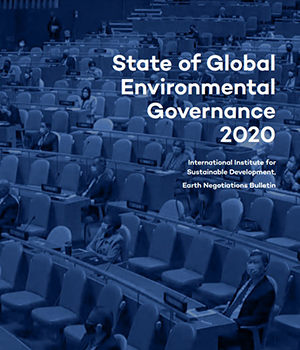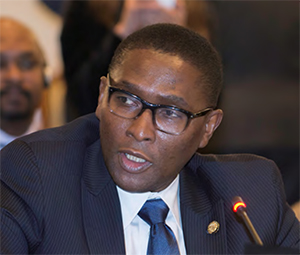There is Cause for Hope in 2021
Foreword to The State of Global Environmental Governance 2020
24 February 2021
 The COVID-19 pandemic brought devastation in 2020, including to plans to ramp up international cooperation on climate action, biodiversity restoration, reducing inequality, and a number of other crises. Yet Selwin Hart, Special Adviser to the UN Secretary-General on Climate Action, opens our report on The State of Global Environmental Governance 2020 with optimism.
The COVID-19 pandemic brought devastation in 2020, including to plans to ramp up international cooperation on climate action, biodiversity restoration, reducing inequality, and a number of other crises. Yet Selwin Hart, Special Adviser to the UN Secretary-General on Climate Action, opens our report on The State of Global Environmental Governance 2020 with optimism.
The Earth Negotiations Bulletin team invites you to consider his words and then dive into our analysis at the lessons from 2020 in environmental diplomacy and how we rebuild momentum in the age of the coronavirus.
 "The world needs an urgent course correction. However, as we enter 2021, there is cause for hope that this correction can be achieved.
"The world needs an urgent course correction. However, as we enter 2021, there is cause for hope that this correction can be achieved.
Undeniably, we remain off-track to achieve the objectives of the Paris Agreement, and the pandemic has set back progress across many of the Sustainable Development Goals.
UN Secretary-General António Guterres has said very bluntly that we are waging a war on nature. The COVID-19 pandemic exposed not only our unsustainable use and destructive use of natural resources, it also showed the consequences of the endemic inequalities that exist between and with countries. More and more, we see nature is striking back: rising temperatures, wildfires, floods, cyclones, and hurricanes are a devastating new normal.
Fossil fuel production continues to rise by 2% annually, when it needs to be falling by 6% every year. Countries are providing more financing for fossil fuel subsidies than for renewable energy.
But there are signs of change. As the world experiences the ever-accelerating impacts of climate change—and the rising costs of inaction—more governments, businesses, investors, and civil society leaders are stepping up their level of ambition and action.
More and more countries are recognizing that there is an urgent need to vastly scale up their climate efforts, and we are encouraged by recent announcements from several major emitters and many global businesses committing to carbon neutrality, as the Secretary-General and many others have been urging. We enter 2021 with countries producing over half of global CO2 emissions now committed to a net zero future, with this figure set to rise to two-thirds early in 2021.
The recent Climate Ambition Summit, held to mark the five-year anniversary of the Paris Agreement, has sent strong signals that more countries and more businesses are ready to take the bold climate action on which our future security and prosperity depend.
As we look ahead, the central objective of the United Nations for 2021 is to build a truly global coalition for carbon neutrality, for global net zero emissions of greenhouse gases in 2050. But pledges are just the first step. Now, all countries must show ambition in their new and enhanced national determined contributions that they are obliged to submit ahead of COP26. The pledges must be backed up by real action now.
This transition must be just, with social protection and support for workers and others affected by decarbonization. And reducing emissions is only part of the
challenge—we need to adapt to the impacts that climate change is bringing and build resilience that can save lives and property. The Secretary-General has called for a breakthrough on adaptation and resilience that prioritizes the needs of those on the frontlines of the climate crisis. All donors and multilateral development banks (MDBs) should commit to direct at least 50% of their climate finance support toward adaptation and resilience building.
As we move forward into 2021, finance for climate action needs to rise significantly. Developed countries need to meet their pledge of at least USD 100 billion a year to developing countries, for both reducing emissions and building resilience. All MDBs and public development banks should commit to align their policies, portfolios, and projects with the goals of the Paris Agreement.
The scientific community tells us that to reach net zero by 2050, we need to cut emissions by 45% by 2030 compared with 2010 levels. Now it is time for every country, city, financial institution, and company to adopt plans for transitioning to net zero emissions by 2050, backed by the actions that will make that happen.
A report such as this helps us to take stock of the year that was, such as it was. We can learn from one another. Since 1992, the Earth Negotiations Bulletin team has spent countless hours in negotiation rooms, covering nearly every meeting on the major environmental issues. This year, they too moved online. In this report, they look across the various processes that negotiate rules to address our most urgent crises. They distill what 2020 meant for the world around us, and for our ability to respond to the threats posed by it.
I commend this vital work, as it is crucial that the world has clear-eyed and objective facts available from many sources on which to base the decisions that will determine our present and our future. In 2021, on the long and challenging road to Glasgow, the stakes are higher than ever. But so, too, the opportunities greater than ever—for people, prosperity, and planet—if we get these decisions right."
— Selwin Hart, Special Adviser to the Secretary-General on Climate Action and Assistant Secretary-General for the Climate Action Team